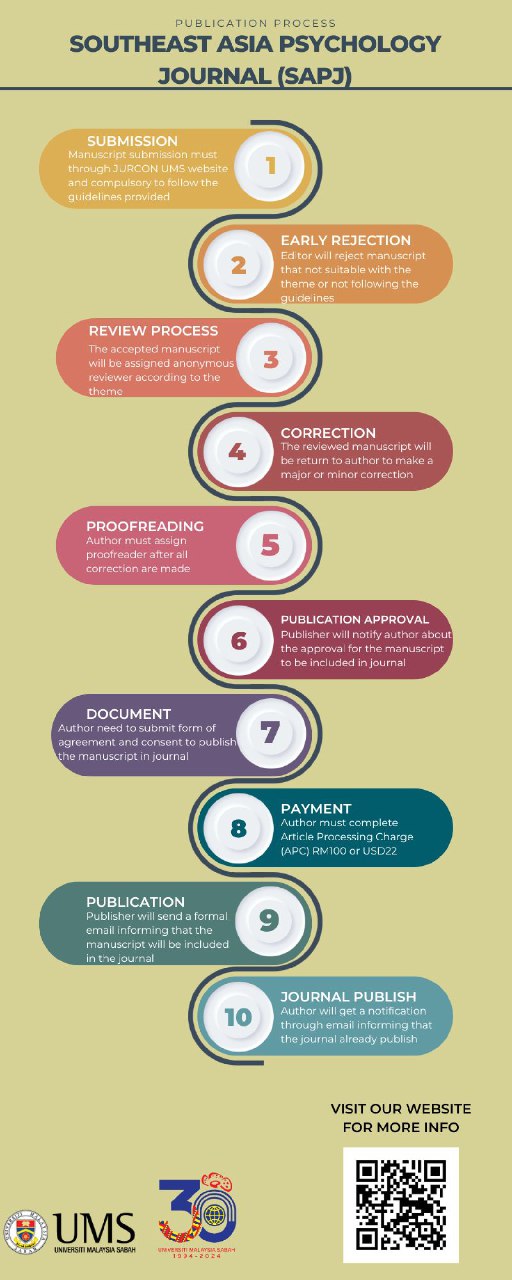LETTING BYGONES BE BYGONES: THE STABILITY OF FORGIVINGNESS TENDENCY
The Stability of Forgivingness Tendency
DOI:
https://doi.org/10.51200/sapj.v13i1.6037Keywords:
Forgivingness, Personality, Stability, Age, ChangeAbstract
Over the past decades, forgivingness has been hypothesized as a stable personality trait. Despite this early assertion, little to no evidence supports this claim. This study investigated the stability of forgivingness tendency over time, seeking to answer whether an individual’s disposition to forgive is stable or changes over time. Moreover, it aimed to determine the age trajectory at which an individual’s forgivingness tendency becomes relatively stable. The purpose of the study was to test the Personality Stability Theory of McCrae and Costa (1994) and Caspi et al. (2005) in terms of forgivingness. This study used a quantitative, cross-sectional design, and data were collected via an online survey. Descriptive statistics, one-way analysis of variance (ANOVA), and post-hoc tests were used in data analyses. The results showed a change in an individual’s dispositional forgivingness between early and middle adulthood, while no changes were observed between middle and older adults. Forgivingness, therefore, becomes stable upon reaching middle adulthood.
References
Abid, M., Shafiq, S., Naz, I., & Riaz, M. (2015). Relationship between Personality Factors and Level of Forgiveness among College Students. International Journal of Humanities and Social Science, 5(7). http://www.ijhssnet.com/journals/Vol_5_No_7_July_2015/17.pdf
Allemand, M. (2008). Age differences in forgivingness: The role of future time perspective. Journal of Research in Personality, 42(5), 1137–1147. https://doi.org/10.1016/j.jrp.2008.02.009
Ardelt, M. (2000). Still Stable after All These Years? Personality Stability Theory Revisited. Social Psychology Quarterly, 63(4), 392. https://doi.org/10.2307/2695848
Baskin, T. W., & Enright, R. D. (2004). Intervention Studies on Forgiveness: A Meta‐Analysis. Journal of Counseling & Development, 82(1), 79–90. https://doi.org/10.1002/j.1556-6678.2004.tb00288.x
Berry, J. W., Worthington, E. L., O’Connor, L. E., Parrott, L., & Wade, N. G. (2005). Forgivingness, Vengeful Rumination, and Affective Traits. Journal of Personality, 73(1), 183–226. https://doi.org/10.1111/j.1467-6494.2004.00308.x
Berry, J. W., Worthington, E. L., Parrott, L., O’Connor, L. E., & Wade, N. G. (2001). Dispositional Forgivingness: Development and Construct Validity of the Transgression Narrative Test of Forgivingness (TNTF). Personality and Social Psychology Bulletin, 27(10), 1277–1290. https://doi.org/10.1177/01461672012710004
Bleidorn, W., Hopwood, C. J., Back, M. D., Denissen, J. J. A., Hennecke, M., Hill, P. L., Jokela, M., Kandler, C., Lucas, R. E., Luhmann, M., Orth, U., Roberts, B. W., Wagner, J., Wrzus, C., & Zimmermann, J. (2021). Personality Trait Stability and Change. Personality Science, 2(1), e6009. https://doi.org/10.5964/ps.6009
Bono, G., McCullough, M. E., & Root, L. M. (2008). Forgiveness, Feeling Connected to Others, and Well-Being: Two Longitudinal Studies. Personality and Social Psychology Bulletin, 34(2), 182–195. https://doi.org/10.1177/0146167207310025
Brose, L. A., Rye, M. S., Lutz-Zois, C., & Ross, S. R. (2005). Forgiveness and personality traits. Personality and Individual Differences, 39(1), 35–46. https://doi.org/10.1016/j.paid.2004.11.001
Brown, R. P. (2003). Measuring Individual Differences in the Tendency to Forgive: Construct Validity and Links with Depression. Personality and Social Psychology Bulletin, 29(6), 759–771. https://doi.org/10.1177/0146167203029006008
Brudek, P., Steuden, S., & Kaleta, K. (2023). Wisdom and wellbeing in polish older adults: The mediating role of forgiveness. Frontiers in Psychology, 14, 1163113. https://doi.org/10.3389/fpsyg.2023.1163113
Caspi, A., Roberts, B. W., & Shiner, R. L. (2005). Personality Development: Stability and Change. Annual Review of Psychology, 56(1), 453–484. https://doi.org/10.1146/annurev.psych.55.090902.141913
Costa, P. T., Herbst, J. H., McCrae, R. R., & Siegler, I. C. (2000). Personality at Midlife: Stability, Intrinsic Maturation, and Response to Life Events. Assessment, 7(4), 365–378. https://doi.org/10.1177/107319110000700405
De Leon, M. S. L., & Lopez, G. D. (2017). What does it take to forgive? Predictors of forgiveness among Filipino late adolescents. International Journal of Research Studies in Psychology, 6(2). https://doi.org/10.5861/ijrsp.2017.1700
Diener, E., Lucas, R. E., & Scollon, C. N. (2006). Beyond the hedonic treadmill: Revising the adaptation theory of well-being. American Psychologist, 61(4), 305–314. https://doi.org/10.1037/0003-066X.61.4.305
Edwards, T. (2015). The Influence of Personal, Relational, and Contextual Factors on Forgiveness Communication Following Transgressions in Romantic Relationships. ETD Archive. https://engagedscholarship.csuohio.edu/etdarchive/591
Ermer, A. E., & Proulx, C. M. (2016). Unforgiveness, depression, and health in later life: The protective factor of forgivingness. Aging & Mental Health, 20(10), 1021–1034. https://doi.org/10.1080/13607863.2015.1060942
Fincham, F. D. (2000). The kiss of the porcupines: From attributing responsibility to forgiving. Personal Relationships, 7(1), 1–23. https://doi.org/10.1111/j.1475-6811.2000.tb00001.x
Florendo, C. G., Maglonzo, E. I., & Guizon-Bautista, T. T. (2013). A Validation Study of the Filipino Heartland Forgiveness Scale. The Filipino Family Physician, 5, 139–143.
Ghaemmaghami, P., Allemand, M., & Martin, M. (2011). Forgiveness in younger, middle-aged and older adults: Age and gender matters. Journal of Adult Development, 18(4), 192–203. https://doi.org/10.1007/s10804-011-9127-x
Headey, B. (2006). Subjective Well-Being: Revisions to Dynamic Equilibrium Theory using National Panel Data and Panel Regression Methods. Social Indicators Research, 79(3), 369–403. https://doi.org/10.1007/s11205-005-5381-2
Headey, B. (2010). The Set Point Theory of Well-Being Has Serious Flaws: On the Eve of a Scientific Revolution? Social Indicators Research, 97(1), 7–21. https://doi.org/10.1007/s11205-009-9559-x
Ingersoll-Dayton, B., & Krause, N. (2005). Self-Forgiveness: A Component of Mental Health in Later Life. Research on Aging, 27(3), 267–289. https://doi.org/10.1177/0164027504274122
Kaleta, K., & Mróz, J. (2018). Personality traits and two dimensions of forgivingness. Annals of Psychology, 21(2), Article 2. https://doi.org/10.18290/rpsych.2018.21.2-3
Lawler-Row, K. A., & Piferi, R. L. (2006). The forgiving personality: Describing a life well lived? Personality and Individual Differences, 41(6), 1009–1020. https://doi.org/10.1016/j.paid.2006.04.007
Levinson, D. J. (1986). A Conception of Adult Development. American Psychologist, 41(1), 3–13. https://doi.org/10.1037/0003-066X.41.1.3
Li, H., Wade, N. G., & Worthington, E. L. (2020). Editorial: Understanding the Processes Associated With Forgiveness. Frontiers in Psychology, 11, 628185. https://doi.org/10.3389/fpsyg.2020.628185
López, J., Serrano, M. I., Giménez, I., & Noriega, C. (2021). Forgiveness Interventions for Older Adults: A Review. Journal of Clinical Medicine, 10(9), Article 9. https://doi.org/10.3390/jcm10091866
Luhmann, M., Hofmann, W., Eid, M., & Lucas, R. E. (2012). Subjective well-being and adaptation to life events: A meta-analysis. Journal of Personality and Social Psychology, 102(3), 592–615. https://doi.org/10.1037/a0025948
Lykken, D., & Tellegen, A. (1996). Happiness Is a Stochastic Phenomenon. Psychological Science, 7(3), 186–189. https://doi.org/10.1111/j.1467-9280.1996.tb00355.x
McCrae, R. R., & Costa, P. T. (1994). The Stability of Personality: Observations and Evaluations. Current Directions in Psychological Science, 3(6), 173–175.
McCullough, M. E., Fincham, F. D., & Tsang, J.-A. (2003). Forgiveness, forbearance, and time: The temporal unfolding of transgression-related interpersonal motivations. Journal of Personality and Social Psychology, 84(3), 540–557. https://doi.org/10.1037/0022-3514.84.3.540
McCullough, M. E., Pargament, K. I., & Thoresen, C. E. (Eds.). (2000). Forgiveness: Theory, research, and practice (pp. xviii, 334). The Guilford Press.
McCullough, M. E., & Witvliet, C. (2001). The Psychology of Forgiveness. In Handbook of Positive Psychology (pp. 446–458). https://doi.org/10.1093/oso/9780195135336.003.0032
Mullet, E., Barros, J., Veronica Usaï, L. F., Neto, F., & Rivière Shafighi, S. (2003). Religious Involvement and the Forgiving Personality. Journal of Personality, 71(1), 1–19. https://doi.org/10.1111/1467-6494.t01-1-00003
Neto, F. (2007). Forgiveness, personality and gratitude. Personality and Individual Differences, 43(8), 2313–2323. https://doi.org/10.1016/j.paid.2007.07.010
Peterson, C., & Seligman, M. E. P. (2004). Character strengths and virtues: A handbook and classification (pp. xiv, 800). American Psychological Association.
Roberts, B. W., & Caspi, A. (2003). The Cumulative Continuity Model of Personality Development: Striking a Balance Between Continuity and Change in Personality Traits across the Life Course. In U. M. Staudinger & U. Lindenberger (Eds.), Understanding Human Development (pp. 183–214). Springer US. https://doi.org/10.1007/978-1-4615-0357-6_9
Roberts, B. W., & Mroczek, D. (2008). Personality Trait Change in Adulthood. Current Directions in Psychological Science, 17(1), 31–35. https://doi.org/10.1111/j.1467-8721.2008.00543.x
Roberts, B. W., Walton, K. E., & Viechtbauer, W. (2006). Patterns of mean-level change in personality traits across the life course: A meta-analysis of longitudinal studies. Psychological Bulletin, 132(1), 1–25. https://doi.org/10.1037/0033-2909.132.1.1
Roberts, K., Jaurequi, M. E., Kimmes, J. G., & Selice, L. (2021). Trait Mindfulness and Relationship Satisfaction: The Role of Forgiveness Among Couples. Journal of Marital and Family Therapy, 47(1), 196–207. https://doi.org/10.1111/jmft.12440
Roberts, R. C. (1995). Forgivingness. American Philosophical Quarterly, 32(4), 289–306.
Rungduin, D. C., & Rungduin, T. T. (2013). The emergence of Filipino values among forgiveness studies. International Journal of Research Studies in Psychology, 2(4). https://doi.org/10.5861/ijrsp.2013.367
Rungduin, D. C., Rungduin, T. T., & Ray B. Acopio, J. (2021). Role of Shared Identity (Kapwa) in Forgiving Others: A Collectivistic Approach in Understanding Forgiveness. Pakistan Journal of Psychological Research, 35(4), 617–636. https://doi.org/10.33824/PJPR.2020.35.4.33
Sandage, S. J., Worthington, E. L., Hight, T. L., & Berry, J. W. (2000). Seeking Forgiveness: Theoretical Context and an Initial Empirical Study. Journal of Psychology and Theology, 28(1), 21–35. https://doi.org/10.1177/009164710002800102
Standish, E. (2016). Forgiveness, Health, And Psychological Adjustment In Older Adults. Wayne State University Dissertations. https://digitalcommons.wayne.edu/oa_dissertations/1485
Strabbing, J. T. (2020). Forgiveness and Reconciliation. Australasian Journal of Philosophy, 98(3), 531–545. https://doi.org/10.1080/00048402.2019.1687532
Tao, L., Ji, M., Zhu, T., Fu, H., & Sun, R. (2020). A Pilot Study for Forgiveness Intervention in Adolescents With High Trait Anger: Enhancing Empathy and Harmony. Frontiers in Psychology, 11. https://doi.org/10.3389/fpsyg.2020.569134
Terzino, K. (2010). Self-forgiveness for interpersonal and intrapersonal transgressions. Iowa State University Digital Repository. https://doi.org/10.31274/etd-180810-2907
Thompson, L. Y., Snyder, C. R., Hoffman, L., Michael, S. T., Rasmussen, H. N., Billings, L. S., Heinze, L., Neufeld, J. E., Shorey, H. S., Roberts, J. C., & Roberts, D. E. (2005). Dispositional Forgiveness of Self, Others, and Situations. Journal of Personality, 73(2), 313–360. https://doi.org/10.1111/j.1467-6494.2005.00311.x
Tirrell, J. M. (2022). Forgiveness as a character strength: Toward a developmental model and research agenda. Journal of Moral Education, 51(3), 312–335. https://doi.org/10.1080/03057240.2021.1873754
Toussaint, L. L., Shields, G. S., & Slavich, G. M. (2016). Forgiveness, Stress, and Health: A 5-Week Dynamic Parallel Process Study. Annals of Behavioral Medicine, 50(5), 727–735. https://doi.org/10.1007/s12160-016-9796-6
Toussaint, L. L., & Webb, J. R. (2005). Chapter Twenty-One: Theoretical and Empirical Connections Between Forgiveness, Mental Health, and Well-Being. In Handbook of Forgiveness (pp. 349–362). NY: Routledge. https://doi.org/10.4324/9780203955673.CH21
Toussaint, L. L., Williams, D. R., Musick, M. A., & Everson, S. A. (2001). Forgiveness and Health: Age Differences in a U.S. Probability Sample. Journal of Adult Development, 8(4), 249–257. https://doi.org/10.1023/A:1011394629736
Toussaint, L. L., Worthington, E., & Williams, D. R. (Eds.). (2015). Forgiveness and Health: Scientific Evidence and Theories Relating Forgiveness to Better Health. Springer Netherlands. https://doi.org/10.1007/978-94-017-9993-5
Wagner, J., Orth, U., Bleidorn, W., Hopwood, C. J., & Kandler, C. (2020). Toward an Integrative Model of Sources of Personality Stability and Change. Current Directions in Psychological Science, 29(5), 438–444. https://doi.org/10.1177/0963721420924751
Worthington, E. L. Jr. (2020). The Science of Forgiveness. John Templeton Foundation. https://www.templeton.org/wp-content/uploads/2020/06/Forgiveness_final.pdf








